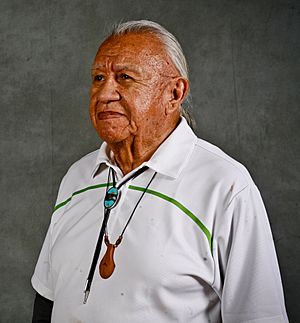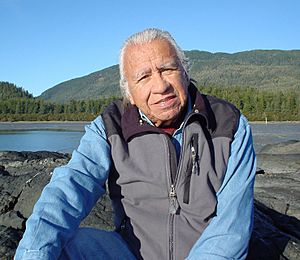Billy Frank Jr. facts for kids
Quick facts for kids
Billy Frank Jr.
|
|
|---|---|

Billy Frank Jr. at the 2012 Ecotrust Indigenous Leadership Award ceremony in Portland, Oregon
|
|
| Born | March 9, 1931 Nisqually, Washington, U.S.
|
| Died | May 5, 2014 (aged 83) Nisqually, Washington, U.S.
|
| Nationality | Nisqually Indian |
| Occupation | Native American rights activist |
| Years active | 1960-2014 |
| Known for | Advocate of tribal fishing rights, leader of "fish-ins" during Fish Wars |
| Relatives |
|
| Awards | Presidential Medal of Freedom |
Billy Frank Jr. (March 9, 1931 – May 5, 2014) was an important Native American leader. He worked to protect the environment and fought for the rights of his people. Billy Frank Jr. was a member of the Nisqually tribe.
He led a big effort to protect fishing rights on the Nisqually River in Washington state. This happened in the 1960s and 1970s. For over 30 years, he was the chairman of the Northwest Indian Fisheries Commission. He believed in working together to manage natural resources.
Billy Frank Jr. was famous for leading "fish-ins" during the Fish Wars. These actions helped lead to the Boldt Decision. This important court ruling said that tribes in Washington state had the right to half of the fish caught each year.
After he passed away, President Barack Obama gave him the Presidential Medal of Freedom. This is a very high honor. In 2015, the Nisqually National Wildlife Refuge was renamed to honor him. Billy Frank Jr. helped connect Native American and Western cultures. He showed how everyone can work together for a healthy environment.
Contents
Early Life
Billy Frank Jr. was born in Nisqually, Washington, in 1931. His parents were Willie and Angeline Frank. His father, Willie, lived to be 104 years old. His mother, Angeline, lived into her 90s.
He grew up on six acres of land by the Nisqually River. This land was known as Frank's Landing. His father bought this land after an Army base expanded nearby. Billy Frank Jr. finished ninth grade in Olympia. After that, he worked in construction during the day. At night, he would go fishing.
In 1952, when he was 21, Frank joined the U.S. Marine Corps. He served for two years.
Fighting for Rights
Billy Frank Jr. was first arrested when he was 14 years old. This happened in 1945 while he was fishing on the Nisqually River. Game wardens stopped him while he was emptying his net. This arrest was the start of his long fight for civil rights.
At first, his reasons for fishing were not as political. But soon, he joined other activists. They wanted to protect the fishing rights of Native Americans.
"Fish-ins"
In the mid-1850s, tribal nations in Western Washington signed treaties with the U.S. government. These treaties said they could fish, hunt, and gather shellfish in their usual places. They could do this along with other U.S. citizens. But when tribal members tried to use these rights off their reservations, they were arrested. The state said they were breaking fishing laws.
By the 1960s, too many commercial boats were fishing. Also, new dams were hurting the salmon. Some people blamed Native Americans for the salmon decline. Billy Frank Jr. became a key leader in the "fish-in" protests. These protests happened during the Fish Wars of the 1960s and 1970s.
The "fish-in" protests started in 1963 in the Pacific Northwest. They grew and even attracted famous people. The actor Marlon Brando was arrested at a protest in 1964. These protests also got national media attention. Eventually, the U.S. government sued the state of Washington.
"Fish-ins" were civil rights protests. They were organized by a group called the Survival of the American Indian Society (SAIA). Billy Frank Jr. was one of the people who started SAIA. Other groups like the NAACP and the National Indian Youth Council (NIYC) helped them. The protests were similar to the Black civil rights protests in the South. But Native Americans also wanted to keep their own culture.
In 1963, Frank began working closely with Hank Adams. Hank Adams was another important Native Rights activist. Billy Frank Jr. was arrested more than 50 times during the Fish Wars. This shows how dedicated he was to protecting treaty fishing rights.
The Boldt Decision
The fight for tribal rights went to court in a case called U.S. v. Washington. In 1974, federal judge George Hugo Boldt made a ruling. He decided in favor of the Native American tribes. This ruling is known as the Boldt Decision.
The Boldt Decision said that 20 treaty Indian tribes in western Washington were co-managers of the salmon. This meant they would work with the State of Washington to manage the salmon. It also confirmed that tribes had the right to half of the salmon caught in western Washington.
What started as a fight over how many fish could be caught became a fight for conservation. It also became a fight to protect salmon habitats. Because of Billy Frank Jr.'s activism, tribes began working more closely with government officials. They worked together to save natural resources. The work Billy Frank Jr. did helped create a partnership between the tribes and the U.S. government.
Northwest Indian Fisheries Commission
The Northwest Indian Fisheries Commission (NWIFC) was started in 1975. Its goal was to help the 20 treaty Indian tribes in western Washington manage their natural resources. The NWIFC is located in Olympia, Washington. It also has offices in Forks and Mount Vernon.
Billy Frank Jr. was the chairman of the NWIFC for over 30 years. He led the commission from 1981 until he passed away in 2014. The commission has about 65 staff members. They help tribes with many things. This includes checking fish health and planning how to manage salmon. They also work to protect salmon habitats. The NWIFC helps tribes talk about their concerns. It also helps them speak with one voice in Washington, D.C.
Honors and Awards
Billy Frank Jr. received many awards for his important work.
- 1985: Common Cause Award, for his work on human rights.
- 1987: Washington State Environmental Excellence Award.
- 1989: American Indian Distinguished Service Award.
- 1990: Martin Luther King Jr. Distinguished Service Award, for helping people.
- 1992: Albert Schweitzer Prize for Humanitarianism.
- 2004: American Indian Visionary Award from Indian Country Today.
- 2006: Dan Evans Stewardship Award.
- 2011: Native American Leadership Award from National Congress of American Indians.
- 2011: Seattle Aquarium Medal.
- 2015: Washington state Medal of Merit.
- November 2015: He was given the Presidential Medal of Freedom by President Barack Obama. This happened in a ceremony at the White House.
- April 14, 2021: Washington Governor Jay Inslee signed a law to honor Frank. A statue of him will be placed in the National Statuary Hall Collection. It will replace a statue of missionary Marcus Whitman.
- 2015: The city of Bellingham, Washington, changed a street name to ‘Billy Frank Jr. Street’. This street is near the Western Washington University campus.
 | Isaac Myers |
 | D. Hamilton Jackson |
 | A. Philip Randolph |


